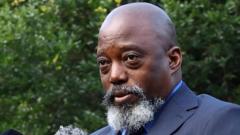The Democratic Republic of Congo's Senate has officially lifted the legal immunity of former President Joseph Kabila, who faces serious accusations of supporting the M23 rebel group in the eastern regions of the country. This decisive step opens the door for Kabila's prosecution on charges of treason and war crimes, a significant development in a country grappling with ongoing conflict and instability.
Senate Speaker Jean-Michel Sama Lukonde announced the outcome of the vote, which saw nearly 90 senators favor the move to prosecute Kabila, who held presidential office from 2001 until 2019. Kabila has reportedly refrained from addressing these allegations publicly, although he has previously denied any connections to the insurgency, which has seized control of multiple towns rich in natural resources.
The military prosecutor's push for this action was predicated on what the authorities claim is substantial evidence implicating Kabila in supporting the M23 group, which has been a source of unrest since its emergence in 2012. Despite residing outside of DR Congo for the last two years, Kabila hinted at a possible return to assist in resolving the eastern conflict. However, reports of his return to Goma were denied by his political party, the People's Party for Reconstruction and Democracy (PPRD).
As part of the legal proceedings, Justice Minister Mutamba announced the seizure of Kabila’s assets, emphasizing the need for him to return home to confront the charges. Observers warn that a trial could exacerbate the country’s volatility, while Kabila's party described the prosecution as mere "theatre" designed to distract citizens from pressing national issues.
As the political drama unfolds, questions linger about the potential impacts on the ongoing conflicts in the region and the future stability of the Democratic Republic of Congo.




















